M.I.A., chronicle of a radical artist who ended up supporting Donald Trump and anti-vaxxers
Not too long ago, the British-Sri Lankan artist represented the future of music, with innovative productions and groundbreaking political messages. Today, her music has taken a backseat to the headlines she generates
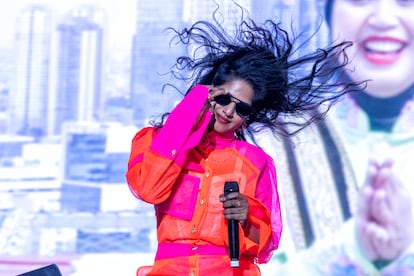
In December 2004, a mixtape titled Piracy Funds Terrorism introduced vocalist M.I.A. and producer Diplo to the world. Although it was an unofficial recording, with thousands of copies pressed on CD and distributed at concerts or over the internet, many publications ended up including it on their best-of lists of that year. The album was an exuberant dance party that included vocal tracks by M.I.A. over (unauthorized) samples of songs by Madonna, Prince, the Bangles, Jay-Z, and Kraftwerk, among others. Where had it all come from?
In reality, Mathangi “Maya” Arulpragasam (London, 1975) had never thought of dedicating herself to music. Her family came from Sri Lanka and belonged to the Tamil ethnic group, persecuted by the government of that country. Her father, who took the nom de guerre Arular, was a leader of the Tamil Tiger guerrilla group, who took up arms seeking independence. But he was also an absent parent while Maya and her mother lived as refugees in the London neighborhood of Acton, in an environment that the artist remembers as “incredibly racist.” Her mother got a job as a seamstress for the Royal Family, and Maya earned a place at the prestigious Central Saint Martins school, where she trained as a visual artist, filmmaker, and fashion designer. At that time, Maya was trying to make social films and began to exhibit her pictorial work (collages influenced by graffiti, Tamil culture, pop art and a strong political tone) under the pseudonym M.I.A. She was even nominated for the alternative Turner Prize and the actor Jude Law was one of the first buyers of her art.
But her course changed when she befriended Justine Frischmann of Elastica, who persuaded her to design the cover art for the band’s album The Menace and film a documentary about her 2001 North American tour. The opening act for those shows was electro-lash singer Peaches, who taught M.I.A. how to use the Roland MC-505 synthesizer and encouraged her to make music. A couple of years later she recorded her first track, Galang, on a limited edition of 500 vinyl singles on a small independent label, Showbiz Records, which was later followed by another single, Sunshowers. Word began to spread on small radio stations, in some underground clubs, and, above all, through file-sharing on the internet. In 2004, she posted several songs on her Myspace page, record labels went after her and she ended up signing with the prestigious label XL Recordings to release her first album, Arular.
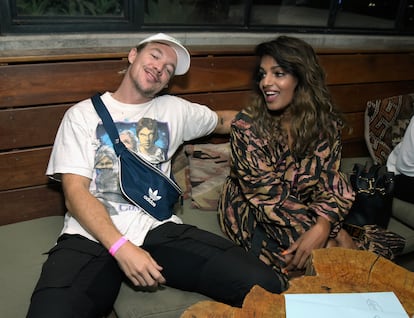
But copyright issues with the samples delayed its release. After meeting Diplo, a then-anonymous producer from Philadelphia, they decided to record the aforementioned mixtape as a promotional tool and creative experiment. This led to M.I.A.’s first official album becoming one of the great independent musical phenomena of the new century. When it finally saw the light of day in March 2005, Arular left no one indifferent. “That mix of pop intuition, hip hop swagger and, for us, exotic rhythms was irresistible,” recalls Juan Manuel Freire, music critic at El Periódico and Rockdelux. “Her first productions with Diplo already included reggaeton and baile funk, but Arular revolutionized the music with that energy that spanned electro, punk, Jamaican music, dancehall, jungle, Tamil music… In addition, she was one of the first viral pop stars in history, perhaps the first in the internet era,” adds Diego Rubio, editor-in-chief of Nuebo magazine.
“Her greatest achievement was taking all those rhythms, from India to Puerto Rico, and giving them just the right twist to make the West fall in love without being accused of cultural appropriation. And using them as a Trojan horse to put war or migration conflicts at the forefront of her lyrics, which many of us wouldn’t hear if they came in the form of protest songs, stadium rock, or world music,” says Cristina Plaza, a musician and all-rounder who, in addition to years of making fanzines and podcasts, currently records and performs under the name Daga Voladora.
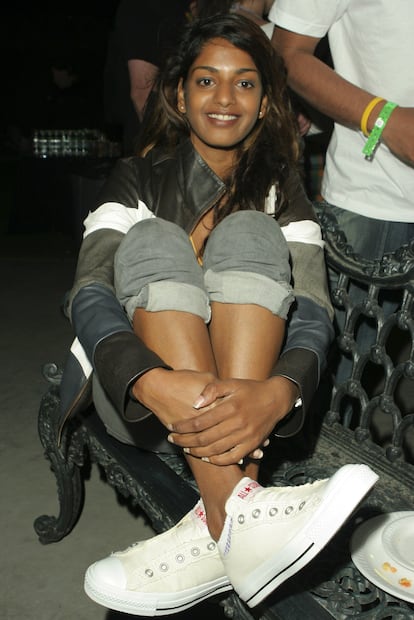
Visionary or radical chic?
Plaza confesses to being a big fan of M.I.A. “I consider her a visionary. There have been very important albums from the last five or six years where you find things that are identical to what she was exploring 20 years ago. In El mal querer, without going any further, I hear a lot of things by M.I.A., and on a visual level, too, like the video for Pienso en tu mirá. I’m sure Rosalía and El Guincho are huge fans. I mean that, either consciously or unconsciously, she is a reference for many relevant artists of today,” she explains.
Arular catapulted M.I.A. into the mainstream, but she too was caught up in contradictions from the very beginning of her career. She wanted to use her position in pop music to raise awareness about the socio-political and humanitarian situation of the Tamil people, but she struggled to gain credibility: living in the metropolis, her friends in Sri Lanka did not take her seriously, and in the West, she was not believed either because of her association with the world of pop and fashion. Her skillful implementation of Emma Goldman’s maxim (“if you can’t dance to it, it’s not my revolution”) did not help her in giving more weight to her message: some of her critics saw the medium as too frivolous or, at best, disconcerting. Much to her annoyance, The New York Times called what she was doing “radical chic,” considering M.I.A. to be nothing more than a nouveau riche, educated at a posh art school, who was demagogic from a supposedly privileged position.
But she also became the subject of academic studies of all kinds. For example, journalist Denise Sullivan highlighted how, in contrast to other rock musicians, M.I.A. was taking the legacy of The Clash further, “stirring up controversy at the same time she was doing it.” In the U.S., she was denied an entry visa and, apparently, the CIA was monitoring her movements. Her second album, Kala (2007), was recorded in India, Angola, Trinidad, Liberia, Jamaica, and Australia; and her songs expanded even further towards a global vision, making reference to problems in developing countries, immigration, poverty, and violence. There was her crowning song, Paper Planes, which was nominated for a Grammy. The same year, O, Saya, composed for the film Slumdog Millionaire, was nominated for an Oscar. When she released her third LP, Maya (2010), she was selling more than ever, and it seemed that everything was set for her to establish herself as the great pop star of the new millennium. But that was not how it turned out.

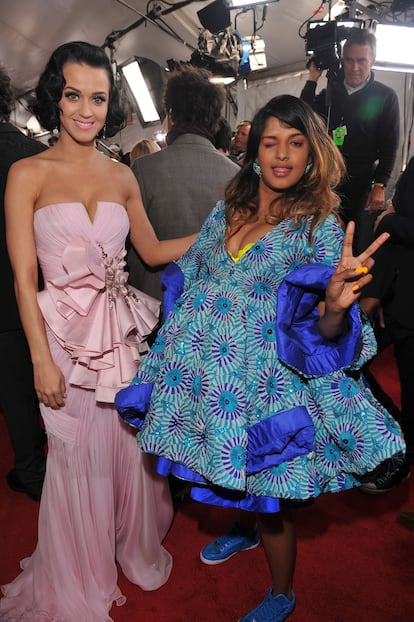
“I also thought she was going to be a new Madonna with more diverse influences, less Anglocentric, more guerrilla-like. And then Maya came along, which contains what I think is M.I.A.’s absolute hit, XXXO, but also many other songs that were more deliberately blurred. It’s as if M.I.A. had rebelled against her own success at that moment and wanted to retreat into the underground,” says Freire. “She was chaotic from the beginning and she was always seen to be uncomfortable with the idea of being a pop star,” adds Rubio. Daga Voladora believes that “to have become that great pop star she would have had to tone down her political discourse and, of course, become much more sexualized. She has never played that card, which is always common in pop.”
Madonna’s Superbowl self-boycott
Freire says that “when M.I.A. wanted to go back to the mainstream, she didn’t do it with the desired aim.” The great opportunity of her career in terms of mass visibility was when Madonna invited her, along with Nicki Minaj, to accompany her during her performance at the Superbowl halftime show in 2012. During the performance, she gave the middle finger to the camera. The National Football League fined her millions and demanded a public apology. But she accused them of hypocrisy, and declared in a video: “Basically, what they are saying is that it is okay for me to promote sexual exploitation as a woman instead of showing female empowerment through punk rock. That is what it all boils down to, and they are suing me for it.”
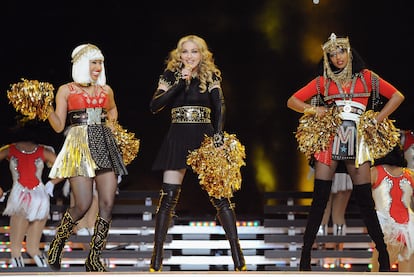
“I think she was naive,” says Daga Voladora. “She must have thought: I am here by my own right, not because this lady brought me here. She turned a blind eye to millions of viewers without realizing the tremendous affront that this represents for Americans. In the documentary made by her collaborator Steve Loveridge (Matangi/ Maya/ M.I.A., 2018), there were images from after the show, in the dressing room, and there she looks really scared. In other words; she did something stupid and realized it. That is when she got the label of being a troublemaker for life.”
“It seemed to me to be a striking but indefinite gesture, that is, less shocking than Sinéad O’Connor tearing up the photo of the Pope,” says Freire. “At the time it caused too much negative publicity and, of course, it did not help her become the next Madonna.” For Rubio it was “a joke that only showed two things: that American society has a problem with puritanism and false morality, and that Madonna always played in favor of the system, even though she was a bit of a Trojan horse at the same time.”
A victim of the pandemic?
Since then, M.I.A. has followed a rather erratic trajectory. Matangi (2013), AIM (2016) and Mata (2022) have been low-profile albums, which have gone unnoticed while other extra-musical factors have ended up attracting more attention: for example, her support for anti-vaxxers or her conversion from Hinduism to Christianity after “experiencing a vision of Jesus Christ,” as she told Zane Lowe of Apple Music 1. The most radical thing, after years of explicitly showing her support for former Labour leader Jeremy Corbyn in the United Kingdom, was a strange tweet in favor of Donald Trump when he added anti-vaxxer Robert F. Kennedy Jr. to his administration. It said: “Trump is going to ride America through the most challenging 4 years coming pulling out weed , and RFK will inherit America when God is ready to replant and rebuild it righteously.”
Trump is going to ride America through the most challenging 4 years coming pulling out weed , and RFK will inherit America when God is ready to replant and rebuild it righteously. https://t.co/dVseN9rcej
— M.I.A. ⊕ II II II (@MIAuniverse) August 23, 2024
“She may have lost her mind a long time ago, but at least she continued making great songs,” says Daga Voladora. “The problem comes when the artistic level drops and what stands out the most is no longer the music or the videos, but her statements, tantrums, and conspiracy theories. But you also have to put yourself in her place: the daughter of immigrants in a very classist country, where you are insulted, marginalized, taken for ignorant, or as an outright idiot. Her childhood and adolescence cannot have been easy, it stands to reason that she is distrustful and her intention is to constantly rebel against authority and the system. She is pure contradiction, and that makes her more interesting.”
This artist believes that there were things M.I.A. got right, such as when she aligned herself with WikiLeaks. “In her song The Message, from 2010, she was already saying that everything was connected to Google and Google was connected to the CIA. In a way, she must have felt that this legitimized all her subsequent opinions and denunciations over the years. But it is one thing to show your support for Julian Assange and another to see conspiracies everywhere 24 hours a day. She is probably a fairly innocent person who is afraid of being taken advantage of, and that is why she has these outbursts. It is a bit incoherent that you go around preaching that the greatest power is that of the united people, and at the same time you come out with something as individualistic, unsupportive, and dangerous as the anti-vaccine thing, for example. More than having a humble origin and dressing in Versace, which is what people usually blame her for and which for me is absolute nonsense,” says Plaza.
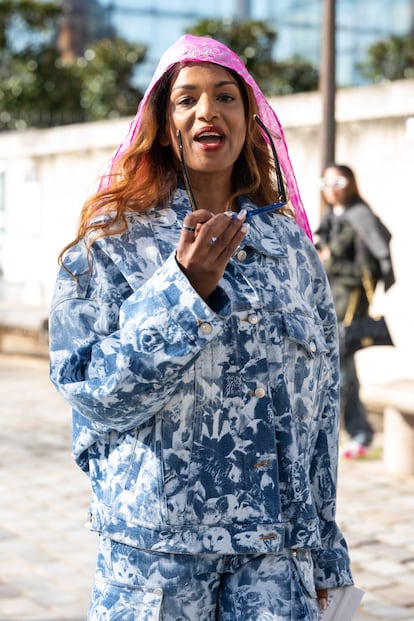
M.I.A.’s latest venture, again outside of music, is the Ohmni fashion line, which she launched in June and is supposed to protect the body from electromagnetic frequencies and 5G, while also boosting fertility. “I actually think she’s made a lot more good decisions throughout her career than bad ones,” says Rubio. “In the end, I think she’s just another victim of the pandemic. I really respect a lot of the things she’s done in the past, the subject matter of many of her lyrics, her audiovisual interests, which over time are even stronger than her flashes of musical genius, and how important she’s been in the 2000s in putting marginal musical scenes and genres on the map, and that constant iconoclastic anti-capitalism.”
Sign up for our weekly newsletter to get more English-language news coverage from EL PAÍS USA Edition
Tu suscripción se está usando en otro dispositivo
¿Quieres añadir otro usuario a tu suscripción?
Si continúas leyendo en este dispositivo, no se podrá leer en el otro.
FlechaTu suscripción se está usando en otro dispositivo y solo puedes acceder a EL PAÍS desde un dispositivo a la vez.
Si quieres compartir tu cuenta, cambia tu suscripción a la modalidad Premium, así podrás añadir otro usuario. Cada uno accederá con su propia cuenta de email, lo que os permitirá personalizar vuestra experiencia en EL PAÍS.
¿Tienes una suscripción de empresa? Accede aquí para contratar más cuentas.
En el caso de no saber quién está usando tu cuenta, te recomendamos cambiar tu contraseña aquí.
Si decides continuar compartiendo tu cuenta, este mensaje se mostrará en tu dispositivo y en el de la otra persona que está usando tu cuenta de forma indefinida, afectando a tu experiencia de lectura. Puedes consultar aquí los términos y condiciones de la suscripción digital.








































